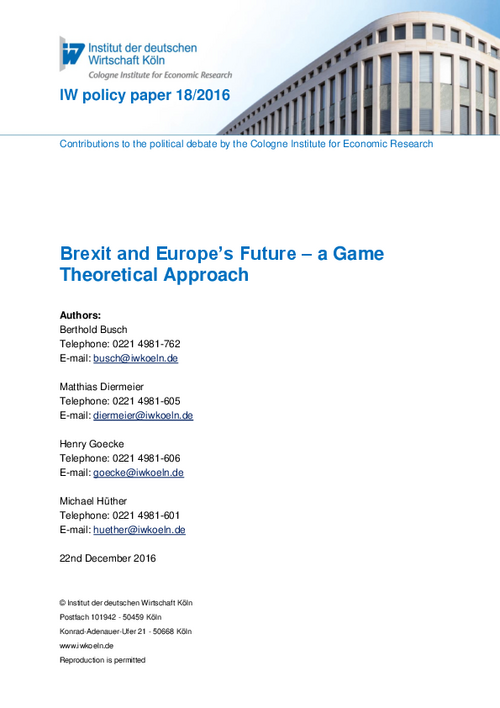After the UK referendum of last summer, the new institutional relationship between the UK and the EU has to be shaped. The question arises as to how relations should be conducted going forward.

Brexit and Europe’s Future: A Game Theoretical Approach
IW policy paper

After the UK referendum of last summer, the new institutional relationship between the UK and the EU has to be shaped. The question arises as to how relations should be conducted going forward.
For the two bargaining parties, the UK and the EU as a whole, the question now is what long and short-term advantages can be obtained, and therefore, which negotiation strategy to pick.
We examine these questions from a game theoretical perspective. Four alternative outcomes (World Trade Organisation; Cherry picking; Norway; Norway+) are analyzed from an economic perspective, both in the long and in the short run. The evaluation is based on the specific characteristic of each outcome with respect to the access to the European single market, free movement of persons, and payments to the EU.
This game theoretical approach yields that the EU – no matter what is economically feasible in the short-run – has to play a tough negotiation strategy if they care about the long-run. The result is not a question of punishment but of pure economic rationale.

Berthold Busch / Matthias Diermeier / Henry Goecke / Michael Hüther: Brexit and Europe’s Future – a Game Theoretical Approach
IW policy paper


Inflation in der Eurozone: Der Weg bleibt holprig
Die Inflation in der Eurozone befindet sich auf dem Rückzug. Ein Aufatmen wäre aber verfrüht. Zweitrundeneffekte im Arbeitsmarkt sind im vollen Gange und setzen die Geldpolitik weiter unter Druck.
IW
Trump oder Harris oder …? Worauf sich Europa einstellen muss
Wenige Monate vor der Präsidentschaftswahl in den USA hat Donald Trump gute Chancen auf eine Wiederwahl. Auf Seiten der Demokraten hat der amtierende Präsident seine Kandidatur nach langem Zögern zurückgezogen, Vizepräsidentin Kamala Harris wird mit hoher ...
IW